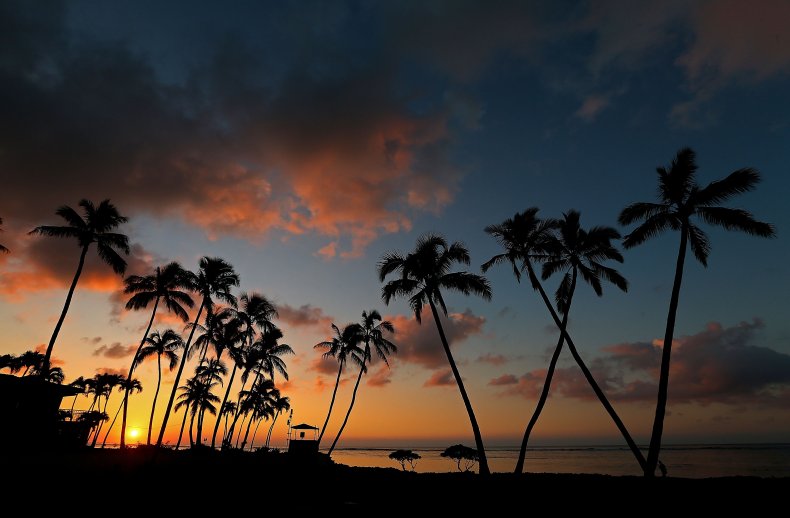Hawaii reported 1,511 new COVID cases Thursday, as the state continues one of the sharpest infection rises in the United States over the past two weeks and nears its daily record of cases set over the summer.
State health officials announced the data Thursday, as Hawaii cases have surged from around 100 daily cases at the start of the month.
The spike in cases across the state is among the fastest increase in new COVID cases in the U.S. over the last two weeks, according to Johns Hopkins University.
The state is rapidly approaching its one-day record of 1,678 cases that was set in August, in the midst of the wave of Delta variant sweeping the U.S.
Now, the Omicron variant is a growing concern in the island state. As of Wednesday, 74 Omicron cases had been confirmed, all on the island of Oahu, but health officials said they are confident the variant has spread to other islands and will likely be confirmed soon.
Dr. Libby Char, director of the state's health department, emphasized the importance of residents getting vaccinated and for those who have been vaccinated to also receive a booster shot, directing her comments at the over 370,000 unvaccinated residents of the state's population of just over 1.4 million.
"We don't want anyone to miss out on time spent with friends, family, and loved ones," Big Island Mayor Mitch Roth said in a statement. "After all, that's what the holidays are all about. However, we are asking that folks spend time in a way that is safe and protects the ones we love and others in our community."

She also said the state has a low rate of people getting boosters, but emphasized that the additional protection is critical for flattening the curve.
"I'm not sure why it's so low and we're trying to figure that out," Char said. "People just have a sense that two shots is enough."
Dr. Rochelle Walensky, director of the U.S. Centers for Disease Control and Prevention, said last week that data suggests Omicron is more transmissible than the Delta variant.
Given that, full vaccination "really should be a three-shot series," Char said.
The state has a test positivity rate of around 8 percent and the most populous island, Oahu, has a positivity rate of over 10 percent, Char added.
Hawaii has had more than 600,000 travelers in December, according to the Hawaii Tourism Authority.
The Aloha State requires travelers to be vaccinated or provide a negative coronavirus test taken within 72 hours of arrival, or face a 10-day quarantine.
Char said state officials are discussing the possibility of requiring a booster shot to avoid travel quarantine or testing as well possibly shortening the window allowed for obtaining a negative test, but no changes have been made.
"The public health recommendation would be, you test as close to flying time as possible and you have your immunizations plus your booster shot," Char said. "But understand that there are challenges in implementing that."
The state previously required all travelers to get tested before they arrived to avoid quarantine, but lifted that mandate as vaccines became more widely available.
"If you can avoid travel right now, avoid travel right now," Char said. "Don't put yourself in those situations."
The U.S. now requires international travelers to test within 24 hours of their trip, regardless of nationality or vaccination status.
Char said health officials are investigating suspected Omicron cases on Maui and the Big Island.
Roth warned people to be careful over the holidays and said to avoid large gatherings, especially indoors.
He suggested that people swap out hugs and traditional Hawaiian greetings for fist bumps and shakas.
"Our island is special because everyone cares for everyone, and that is how we have made it through the pandemic thus far, and it's how we will make it through moving forward," Roth said.
There are no confirmed Omicron cases on Kauai, but the island has seen a spike in new infections.
"With this rapid rise in cases, we can assume that the Omicron variant is on Kauai," said the state Department of Health's district officer for Kauai, Dr. Janet Berreman, in a statement.
Island mayors have not made any changes to current coronavirus restrictions, most of which were lifted in early December.
"We're not going to impose any more restrictions," said Honolulu Mayor Rick Blangiardi, who said the island's vaccination and testing policy for businesses and events is sufficient. "It's about making good decisions, so it's about personal responsibility. Don't go to some place if you fear that it's going to be something that would make you sick. But if you do go and you're indoors, wear your mask."
Blangiardi recently allowed bars and large indoor events to resume. There have been clusters of cases at two of Honolulu's largest nightclubs in recent weeks. Masks are not required while eating or drinking and occupancy limits with distancing rules have been removed.
The Associated Press contributed to this report.

Post a Comment